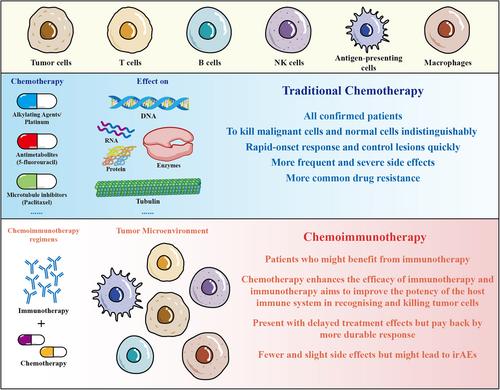Chemoimmunotherapy for esophageal squamous cell carcinoma—Summary and discussion of recent clinical trials
引用次数: 0
Abstract
As a kind of carcinoma with increasing morbidity, poor prognosis, and high mortality, esophageal squamous cell carcinoma (ESCC) is challenging for clinical management. Chemotherapy has been the standard treatment for ESCC over decades, while its clinical outcomes remain unsatisfying. And the regimen that combine standard chemotherapy with targeted therapy also demonstrates little effect. However, the advent of immune checkpoint inhibitors (ICI) proved to be a game changer in cancer treatment. Recent clinical trials had sprung up to evaluate the combined effect of ICI and chemotherapy regarding first‐line ESCC treatment. What's more, researchers attempt to explore the possibility to implement ICI monotherapy regarding second‐line ESCC treatment. In conclusion, most of the first‐line trails present inspiring achievement, while ICI monotherapy indicates little improvement for ESCC treatment. To point out the heterogenicity that could be the potential reasons biasing the pooled results, the differences of PD‐L1 immunohistochemistry (IHC) assays, geographic regions, chemotherapy regimens, and sex disparity among these trails are discussed respectively. In addition, the adverse events occurred during the trails are summarized, which confirm the safety of immunotherapy and chemoimmunotherapy. The article comprehensively reviews the representative explorations of using chemoimmunotherapy strategies in ESCC, as well as the deficiencies among them. Moreover, we highlight some feasible approaches. It will be beneficial for conducting more precise clinical trials on chemoimmunotherapy for ESCC in the future, including the use of more appropriate PD‐L1 IHC assays, careful consideration of the heterogeneity of the enrolled population and the optimal combination of chemotherapy and ICI.

食管鳞状细胞癌的化学免疫治疗——近期临床试验的总结和讨论
食管鳞状细胞癌(ESCC)是一种发病率高、预后差、死亡率高的癌症,临床治疗具有挑战性。几十年来,化疗一直是ESCC的标准治疗方法,但其临床结果仍不令人满意。而将标准化疗与靶向治疗相结合的方案也收效甚微。然而,免疫检查点抑制剂(ICI)的出现被证明是癌症治疗的游戏规则改变者。最近的临床试验如雨后春笋般涌现,以评估ICI和化疗对一线ESCC治疗的联合效果。此外,研究人员试图探索在二线ESCC治疗中实施ICI单一疗法的可能性。总之,大多数一线试验都取得了令人鼓舞的成就,而ICI单药治疗表明ESCC治疗几乎没有改善。为了指出异质性可能是使合并结果产生偏差的潜在原因,分别讨论了这些试验中PD-L1免疫组织化学(IHC)测定、地理区域、化疗方案和性别差异的差异。此外,总结了试验期间发生的不良事件,证实了免疫疗法和化学免疫疗法的安全性。本文全面回顾了化学免疫治疗策略在ESCC中的代表性探索,以及其中的不足。此外,我们强调了一些可行的办法。这将有利于在未来对ESCC进行更精确的化学免疫治疗临床试验,包括使用更合适的PD-L1 IHC测定,仔细考虑入选人群的异质性以及化疗和ICI的最佳组合。
本文章由计算机程序翻译,如有差异,请以英文原文为准。
求助全文
约1分钟内获得全文
求助全文

 求助内容:
求助内容: 应助结果提醒方式:
应助结果提醒方式:


